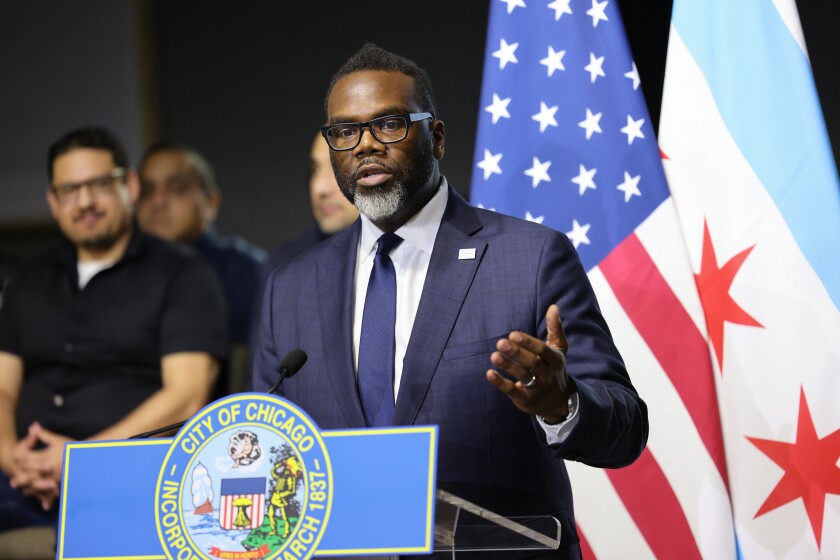Mayor Brandon Johnson’s pension commission has been meeting for a year, and so far there’s no sign of any long-term solutions.
They might want to come up with something fast — the pension mountain is getting steeper to climb.
Chicago’s unfunded pension liability rose by another 5.2% in 2023 — from $35.4 billion to $37.2 billion — thanks to “changes in pension assumptions and legislation,” according to the certified annual financial report for 2023 by the accounting firm of Deloitte & Touche.
It’s the second straight year that the pension crisis has grown by more than 5%.
The Firefighters Pension Fund once again hovers closest to bankruptcy, with assets to cover just 21.6% of liabilities.
That’s followed by Police (21.79%), Municipal Employees (22.2%), and Laborers Pension Funds (38.55%).
Chicago closed the books on 2023 with a total fund balance of $1.05 billion, up from $633.2 million a year ago. Of that total fund balance, $226.6 million was “unassigned” and not yet dedicated for a specific purpose.
The “unassigned” balance could have been higher — and the pension crisis could have been worse — but Johnson followed his predecessor Lori Lightfoot’s lead by devoting $306.6 million to a “pension advance” that exceeds Chicago’s statutory requirement.
“The cliff that we have been talking about as being on the horizon for some time is now here. There’s no more time to … put this off. The hard conversations need to be had now,” Civic Federation President Joe Ferguson said Tuesday.
During his record tenure as the city’s inspector general, Ferguson suggested myriad ways that the city could cut costs and operate more efficiently.
“We’re not talking about quarters in the cushions of the couch. We’re talking about tens and hundreds of millions of dollars. And there has really been no conversation about what those options are,” Ferguson said. “Any call for more revenue that puts further burden on taxpayers absolutely needs to be accompanied [by] best efforts to trim the waste and inefficiency from existing government.”
Before Lightfoot left office, her financial team warned that a pair of pension bills pending before the Illinois General Assembly amounted to “among the largest pension sweeteners in the history of Illinois” with an overall cost exceeding $3 billion through 2055.
Lightfoot was right. Roughly $1 billion — 60% of the increase in unfunded pension liability — is tied to the firefighters pension sweetener, Ferguson said.
During an appearance before the Chicago Sun-Times Editorial Board last month, Johnson expressed his doubts about a casino deal that Chicago is counting on to generate $200 million in annual revenue to stave off bankruptcy of the police and fire pension funds.
The mayor compared the situation to the cost-cutting deal he recently renegotiated with United and American airlines to proceed with the next phase of the O’Hare Airport expansion project.
On Tuesday, Ferguson described the permanent casino as “hanging by a thread” and growing “more remote by the day.”
That puts even more pressure on the mayor’s pension commission and the City Council’s revenue subcommittee that, Ferguson said, “seems to be spinning its wheels.”
During an interview with the Sun-Times last week, Firefighters Union President Pat Cleary was asked about his ideas to stave off insolvency of the firefighters pension fund.
“That’s not my job. That’s the city’s job. … They’re the one who has to pay the bill — not me. … The [state] legislation says it has to be 90% funded by 2055. So I don’t care what the city does. … Whether they get the casino or not, that’s on them. … They still have to pay the bill. That’s the law,” Cleary said.
Pressed to reveal what ideas he has brought to the mayor’s pension commission, Cleary said, “Put some slots in the airports. … Those are money generators, and it’s not city people you’d be taxing there. You’d be getting travelers from outside the city. They already have permission to put them in. So put them in.”
The city audit also revealed that:
- Chicago police made 47,549 “physical arrests” in 2023, up 14.7% from the year before.
- The post-pandemic rebound in air travel continued at O’Hare, where operating revenues rose 13.4% and total “enplanements” went from 34.1 million in 2022 to 36.6 million last year. In all, 73.9 million passengers traveled through O’Hare in 2023, an 8.1% increase from the year before.
- Operating revenue at Midway Airport was also higher; total passenger enplanements were 10.98 million compared to 9.94 million the year before.
Editor’s note: This story has been updated to include the full amount of the pension advance.





